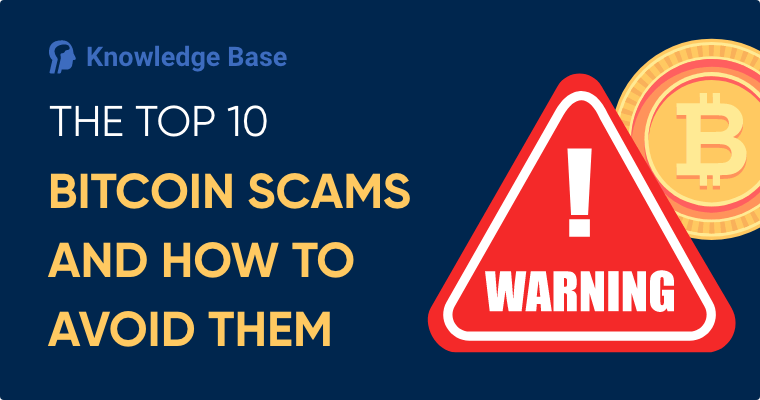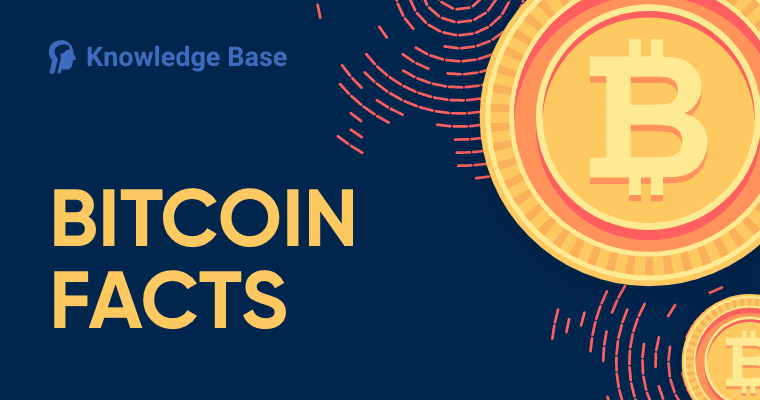Top 10 Bitcoin Scams and How to Avoid Them
Bitcoin’s price skyrocketed to its new all-time high multiple times just while we were writing this article.
Having exceeded $40,000 at the beginning of 2021, Bitcoin is currently sitting around $60,000, although of course, that could change at any time. Still, it seems like the sky’s the limit for this currency’s value and the hype it generates.
During the current bull market, many new investors are looking to turn a quick profit, making it a perfect time for scam artists. In this article, we’ll identify the most common Bitcoin scams and show you how you can avoid them and keep your cryptocurrency safe.
1. Exchange Scams
Most investors who want to buy their first BTC or sell it for a profit will make an account on one of the many cryptocurrency exchanges out there. Since the market is continuously expanding, the need for exchange platforms is also growing.
This has led to scammers creating fake Bitcoin exchanges. They commonly attract users to their fraudulent platforms by offering better exchange rates than other markets, rather than letting supply and demand dictate the price.
The most famous Bitcoin fraud with the involvement of a fake exchange was BitKRX from South Korea. The exchange masqueraded as a branch of the legitimate Korea Exchange (KRX) to earn users’ trust. In 2017, BitKRX users reported that their BTC had been stolen. In fact, the exact value of the BTC that was stolen is not known, but without a doubt, it was worth millions of dollars.
In order to avoid this type of Bitcoin scam, make sure you research the exchange you’re interested in before transferring funds. Use only exchanges with a good reputation and those that are recommended by official sources. For recommended exchanges and advice on the safest way to buy Bitcoin, you can check this list on the official Bitcoin website.
2. Phishing Emails and Websites
Phishing emails and phishing websites represent two sides of the same coin. If you’ve never encountered either of them, consider yourself lucky. To keep things that way, you should understand how these scams work.
Phishing emails try to look like official emails from a trustworthy source. For Bitcoin users, a phishing email could look like an official email from a bank, a cryptocurrency exchange, or another trustworthy source.
Bitcoin phishing scams will always prompt some action from you. For example, they might ask you to log into your account by clicking on the link in the email. This may compromise users’ accounts and lead to a scammer using their credentials to empty out their Bitcoin wallets.
The best way to make sure you have received an official email from the company contacting you is to double-check the sender’s address, contact the company via the official email listed on the webpage, or reach out via social media or the company’s official customer support channels.
Phishing emails commonly link to phishing websites that want to scam Bitcoin from you. These webpages are designed to steal your name and login credentials or infect your device with malware. The difference between these websites and real ones can be difficult to spot at first glance, which is what scammers count on to trick people. Quite often these sites even appear as a sponsored result on search engines.
Unless you’re 100% sure you’re on the official page, do not log in or install anything. Double-check the official website address, and if you’re not sure, search for it again. If you see a sponsored result at the top of your search results, scroll down to confirm it’s the official website. Bookmark the official page of any service you use regularly.
3. Free Bitcoin Giveaway Scams
This should be obvious, but it doesn’t hurt to remind yourself that there’s no such thing as a free lunch. If you do come across a “free Bitcoin” giveaway, it’s almost certainly a scam.
In 2020, one of the most famous scams of this type happened when Twitter was hacked. The accounts of CoinDesk, Binance, Elon Musk, Bill Gates, and even Barack Obama and Joe Biden were used by impersonators to spread this fraud.
The scam offered to double the money you sent to the scammer’s BTC address. It’s a reminder that if something sounds too good to be true, it usually is.
4. Fake Coins and ICOs
According to the Federal Trade Commission (FTC) and the Commodity Futures Trading Commission (CFTC(, among the most damaging cryptocurrency scams are those involving fraudulent coins and ICOs (initial coin offerings).
With the cryptocurrency market booming, finding and investing in the “next Bitcoin” is extremely enticing for investors. However, you can never be sure that your cryptocurrency investments will be successful. If you do decide to invest in altcoins, be wary of potential scams.
Most scam altcoins have an ostentatious website boasting of the large community supporting the project. This is designed to create FOMO (fear of missing out), an effect that may lead you to make an imprudent ICO investment and support a scam coin. Scammers then abandon the project, running off with the money while leaving investors high and dry.
Some scam altcoins may perform an airdrop – a distribution of free coins/tokens. An airdrop may create an inflated image of actual market interest in the coin or token, which drives FOMO in investors, while the biggest holders end up dumping their share for a profit.
So, what can you do to avoid these types of scams? Stay informed, be wary of overly ambitious promises, and never invest more money than you can afford to lose.
5. Bitcoin Ponzi Schemes
Ponzi schemes promise a return on investment for an upfront deposit. Any Ponzi scheme takes money from new investors in order to provide interest payments to previous ones.
Unfortunately, the cryptocurrency space is not immune to these kinds of bad actors. Multiple schemes have offered incredible returns on initial investments while promising to become better and more profitable than Bitcoin.
OneCoin was the biggest scam on the cryptocurrency market, with a total of five billion dollars stolen from investors. The founder of One Coin, Bulgarian national Ruja Ignatova, created a classic pyramid scheme where backers would supposedly earn more with each new investor they brought on. The founder of this scam cryptocurrency is still wanted by law enforcement, while her accomplices and business partners have been arrested.
Bitconnect was another representation of investment scams that offered unrealistic returns; investors were promised 40% interest per month. According to this math, someone who had invested $1,000 would make more than $50 million in less than three years.
In order to do so, you were required to buy and lock in BCC tokens so that they could earn profit thanks to the trading bot. One of the first critics of Bitconnect, Vitalik Buterin, pointed out that this was a Ponzi scheme. Ethereum‘s co-founder was correct and this crypto scam ended with most investors reporting losses: $3.5 billion in total.
These types of scams surface from time to time, so it pays to be informed and know how to recognize them. Promises of enormous profit margins are the first red flag that should give you pause. Keep in mind that Ponzi schemes inevitably end with investors losing their money.
6. Pump-and-Dump Schemes
One crypto scheme whose origins can be traced back to the stock exchange is a pump-and-dump scheme. This is when organized con artists artificially boost the price of a low-valued stock, or in this case an altcoin. While this isn’t a straightforward Bitcoin scam, it still causes other investors to lose out.
A scheme like this often goes hand-in-hand with shilling targeted cryptocurrencies, which is done by spreading fake news and finding celebrities to endorse it and leave testimonials.
This in turn attracts new investors and further boosts the price of the cryptocurrency, even though that doesn’t reflect its real value. Scam artists wait for the moment when the price is high enough to dump their share. Regular investors are left holding cryptocurrency that’s worthless in most cases.
7. Blackmail Emails
Another well-known type of scam is a Bitcoin blackmail email. The scammer sends a message claiming to have obtained your sensitive information, most commonly by hacking your computer and controlling it with a remote desktop protocol. They usually claim to have infected your computer with key-loggers and made video recordings of you by taking over your webcam.
Scammers demand Bitcoins in exchange for destroying the material and not distributing the compromising content to everyone in your email contacts and on your social networks. These types of cryptocurrency scammers use illegally obtained email lists and leaked user data and try to scam many people at once. However, the chances are that scammers don’t actually have compromising material to blackmail you with.
8. Malware and Ransomware
If crypto scams aren’t enough, there are also now viruses that target your Bitcoin wallet keys or the BTC you keep there. Malicious software has definitely become even more innovative, and this is especially true for various types of malware and ransomware.
Hackers use these types of viruses to access your computer networks and steal information. This could be your personal details such as credit card numbers or, in the case of Bitcoin, your private key. The most obvious links containing this type of malware claim that they’ll allow you to mine Bitcoin for free. When you download those files, a Bitcoin scammer will get access to your private information.
Keep in mind that no matter what impressive promises you see, you won’t be able to mine Bitcoin effectively with your regular desktop or laptop computer. Bitcoin requires dedicated hardware called ASIC (application-specific integrated circuit) miners. The last time Bitcoin was seriously mined with CPUs or GPUs, a Papa John’s pizza cost around 10,000 BTC.
Another type of virus associated with Bitcoin is ransomware. This type of malware encrypts files on your computer or blocks you from using your device altogether. After that, it demands that you pay a ransom in Bitcoin to decode your data or unblock your computer. As is the case with other Bitcoin frauds, paying the BTC ransom doesn’t guarantee that the hacker will unblock your computer or decrypt your information.
The most helpful advice here is to install antivirus and malware protection on your computer and other devices. Even free antiviruses can help you avoid getting scammed and save you the ensuing headache.
However, if the damage is already done and your computer is infected, don’t pay the ransom. Seek help from an IT specialist, who should be able to remove the ransomware from the afflicted device.
9. Cloud Mining Scams
If you’ve spent even a few minutes learning about Bitcoin, you’ll have heard of mining. Bitcoin mining is actually the process of verifying Bitcoin transactions, which requires a huge amount of computing power and electricity.
Some services will offer to mine Bitcoin for you for a fixed rate using their infrastructure. There’s nothing wrong with this per se, but the supposed returns of renting hash power from a cloud mining service are often unrealistic.
One such platform that offered cryptocurrency mining services was BitClub Network, which operated from April 2014 to December 2019. Investors’ money was solicited in exchange for shares of cryptocurrency mining pools, and users were rewarded for recruiting new investors into the scheme.
However, the BitClub Network was operating a cloud mining scam. The fraudsters behind the business manipulated the numbers to show that they were earning more than what they actually were. In the end, they took $722,000,000 worth of Bitcoin from investors.
If you’re interested in investing in Bitcoin, you’d be better off purchasing BTC from a trustworthy exchange rather than investing in a cloud mining service. Even if the service isn’t a scam, mining profitability fluctuates depending on the market value, and with so many variables to track, it’s hard to know whether you’re getting a good deal.
10. Meeting in Person
You may think that by selling Bitcoin in person, you’ll avoid the perils of online trading. However, Bitcoin trading scams don’t always happen online.
If you’re meeting an unknown buyer, the risk of being robbed or getting injured is quite high. Another tactic con men commonly employ is to use counterfeit money to buy Bitcoin from you.
In order to avoid these risks, try finding a P2P (peer-to-peer) platform to exchange funds rather than taking the risk of meeting with a malicious party in person. A peer-to-peer network provides you with security and privacy, and most of them don’t enforce know your customer (KYC) or anti-money laundering (AML) policies.
Knowing Cryptocurrency Scam When You See it
Money attracts scammers, and Bitcoin is the perfect target for scam artists. The key difference is because of our long experience with fiat money, we know what kind of trickery to expect and how to avoid it.
If your credit card gets stolen or a fraudulent purchase is made on it, you know how to contact your bank and get it resolved. If you carry cash on you, you know not to leave it sticking out of your back pocket.
If you’re using Bitcoin, you need to learn how to keep it safe and recognize when someone is trying to con you. That’s why understanding the most common Bitcoin scams will help you handle crypto as easily as fiat currencies.
FAQ
1. How do Bitcoin scams work?
All Bitcoin scams have one thing in common: they relieve you of your hard-earned Bitcoin if you’re careless. Most of these schemes are not new to the cryptocurrency market, but are classic scams that have evolved with the technology.
Among these are Ponzi or pyramid schemes, which masquerade as legitimate businesses but trick you out of your Bitcoin. There are also many false promotions offering free Bitcoin if you send some of your own BTC to scammers’ addresses. You can avoid these if you remember that there is no such thing as a free lunch.
While there is no definitive Bitcoin scammer list that you can refer to, you can use our guide to familiarize yourself with the most common scams.
2. How can you tell a Bitcoin scammer?
A foolproof way of identifying someone as a Bitcoin scammer or an imposter is if they offer you free Bitcoin. If you remember this, you’re much less likely to get tricked and end up empty-handed.
In 2020, Twitter was hacked and accounts from verified users – ranging from Elon Musk to Joe Biden – offered to return double the amount of Bitcoin to anyone who sends it to them. It seems crazy that someone would fall for such a clear con, but sadly it works.
This type of Bitcoin hoax is the most common, but thankfully it’s also the easiest to identify.
3. Are there Bitcoin scams?
Sadly, there are scammers and sharks circling every profitable industry looking for victims, and Bitcoin is no different.
4. Can you get Bitcoin back from a scammer?
Getting Bitcoin back from a scammer is even harder than recovering stolen fiat currency. However, there are four ways you can try to recover your BTC:
- If you lose your funds to fraudulent cryptocurrency investment platforms, threatening legal action or reporting companies to the government or financial authorities is the best first step.
- File a complaint to the appropriate financial authorities.
- Try finding help online and see if others have managed to resolve the same issue.
- Hire BTC recovery experts. Bitcoin scams leave transaction information on the blockchain, which acts as a public ledger. With that information, experts can potentially track the thief down.






